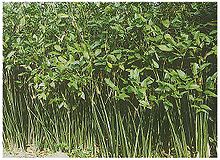Schumannianthus dichotomus
| Schumannianthus dichotomus | |
|---|---|
 |
|
| Scientific classification | |
| Kingdom: | Plantae |
| (unranked): | Angiosperms |
| (unranked): | Monocots |
| (unranked): | Commelinids |
| Order: | Zingiberales |
| Family: | Marantaceae |
| Genus: | Schumannianthus |
| Species: | S. dichotomus |
| Binomial name | |
|
Schumannianthus dichotomus (Roxb.) Gagnep. |
|
| Synonyms | |
|
|
Schumannianthus dichotomus, also known as 'cool mat', was first described by Roxburgh, with its current name after Gagnepain. The plant belongs to the family Marantaceae and no subspecies are listed.
S. dichotomus is typically found in muddy riparian areas; it is known as Pati Doi in Assamese and Murta, Mostak, and Pati bet patipata and paitara in Bengali; in Vietnamese it is called lùm nước
It is a rhizomatous plant with an erect and glossy green stem attaining a height of 3–5 m and a diameter of up to 20 mm. The stems are leafy and dichotomously branched.
Geographically it is distributed in northeast Bangladesh, West Bengal, Assam, Burma, Thailand, Cambodia, Vietnam, Peninsular Malaysia, Borneo and the Philippines.
In India it is found in riverine areas like Majuli island in Assam, and Comilla, Tangail; in Bangladesh the plant is found especially in the swamp forests of Sylhet[1] and is cultivated mostly in the districts of Sylhet, Sunamganj, Barisal, Tangail, Comilla, Noakhali, Feni and Chittagong.
The plant used for making the Shital pati a traditional bed mat in Eastern India and Bangladesh. Traditional artisans make strips from the outer portion of the stem including the epidermal part. These split strips are processed and plaited into mats. Murta splits are also used for making prayer mats, baskets, bags, novelty items, etc. The strips from the pith portion are used as binding materials.
...
Wikipedia
